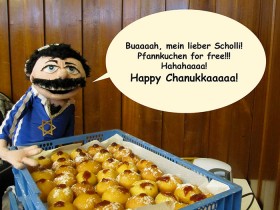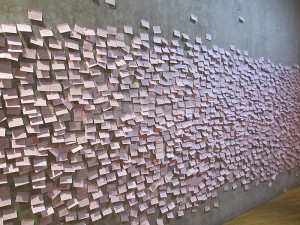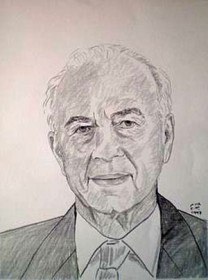
One of the hand puppets from Shlomit Tulgan’s bubales family saying “Oooh, my oh my! Hotcakes for free!!!”
CC-BY Shlomit Tulgan
I was asked recently if I could write something about how I celebrate Hanukkah in my own circle of family and friends. It occurred to me that the last time I spent Hanukkah with friends or with my parents was quite awhile back. I rummaged around through old photos until I found a picture of me with my father in 1988, lighting our Hanukkah candelabrum: we had just applied for political asylum in West Berlin and were allowed to stay with friends, so we didn’t have to remain longer in refugee quarters. For me back then, Hanukkah was a personal, family thing. → continue reading
Remembering 4 November 1995
Twenty years ago today, 4 November 1995, Israel prime minister, Yitzhak Rabin, was assassinated following a peace rally in central Tel Aviv. Mirjam Wenzel was there.
“It was a mild evening at Kikar Malchei Yisrael (Kings of Israel Square, now Yitzhak Rabin Square) in the middle of Tel Aviv, where throngs of people had gathered under signs of shalom achshav (peace now) to show their support for Rabin and Shimon Peres and their push for peace. The national religious movement had grown more hostile towards the government in recent weeks, and the media had been reporting its demonstrations with posters of Rabin in a SS uniform. No one could imagine, at least not within my circles, that this movement could turn deadly. From the Tel Aviv office of the Friedrich Ebert Foundation, where I had a semester internship, the Oslo Accords were viewed as a political and economic fact. → continue reading

A wall full of questions at the exhibition “The whole truth” © Jewish Museum Berlin, photo: Thomas Valentin Harb
The special exhibition entitled “The whole truth… everything you always wanted to know about Jews” ended more than a year ago. Besides the animated discussions and empty display cases, there are thousands of pink post-it notes left over. Visitors stuck their questions, commentary, and impressions on a concrete wall after they went through the exhibition and left the museum. A kind of analog “facebook” arose out of these contributions, above and beyond the contents of the exhibition itself. Visitors commented on each others’ notes and raised new questions: on the history of Jews in Germany, on the conflict in the Middle East, on the relationship between Christianity and Judaism, and – again and again – on the subject of circumcision. At this point, the Jewish Museum Berlin had already decided to dedicate not just another blog post to the contentious topic (as part of the series “Question of the month”), but an entire new exhibition.
We recall: → continue reading


